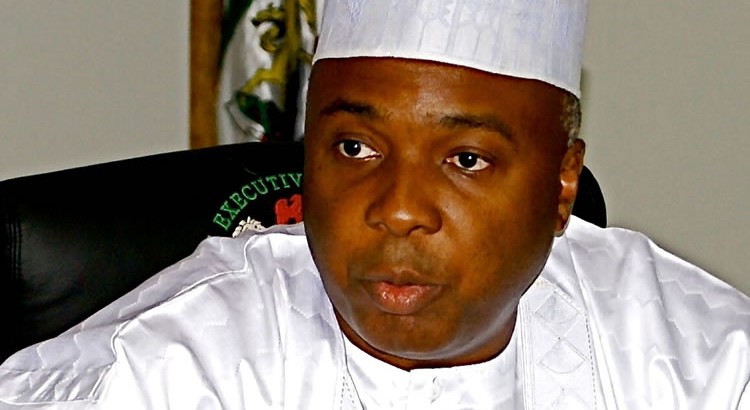Former Senate President of the Federal Republic of Nigeria, Dr. Abubakar Bukola Saraki has maintained that credible elections can only bring about the good governance, noting that without credible election there can never be good governance.
By Abdulrahman Aliagan, Abuja
Former Senate President of the Federal Republic of Nigeria, Dr. Abubakar Bukola Saraki has maintained that credible elections can only bring about the good governance, noting that without credible election there can never be good governance.
Saraki stated this on the virtual session hosted by Centre for Liberty Nigeria to mark year 2020 International Day of Democracy with the theme: “The Urgency of Electoral Reforms and the Sustenance of Democracy in Nigeria”.
The session that was anchored by the Sir Ariyo-Dare Atoye of the Centre equally has the former Speaker of House of Representatives as Co-Panelists in the interactive session that lasted for about 1hr: 30 minutes.
Dr. Saraki said that, “Good governance is a way of measuring how public institutions conduct public affairs and manage public resources in a preferred way, the process of decision-making and the process by which decisions are implemented”.
He attributed the reasons, why vote doesn’t count in Nigeria to the level of poverty and education. He added, “If citizens know that selling their votes on the Election Day is negative to growth and development their state and local government, they won’t do it. The same thing goes to religion and ethnicity.”
He stated further that, Nigerians need more awareness on electoral process and good governance, he said, “Irrespective of your religion belief or ethnic nationalities that is not what is important, he added that, “The most important thing is who can deliver on our mandates.”
He assured that Nigeria will get there, but overtime, “When people begin to see the effect of bad governance and that they cannot continue to live in an environment of bad government, they will look for who best can deliver on their mandates.”
In his contribution to Electoral Reforms, Alhaji Ghali Naaba said Nigerians need political education, he said, “It is very necessary for us to achieve dividends of democracy, adding that democracy is expected to transform our lives for the better and not other way round.
Centre for Liberty Nigeria is a non-violent direct action group and a tripartite coalition group of concerned Nigerians, adopt A Goal Initiative and Free Nigerian movement. The group is being led by Nigerians who are dedicated to rebuilding Nigeria through fearless and purposeful citizens’ against impunity, injustice and bad leadership throughout Nigeria.
Globally, the theme for International Day of Democracy 2020 is “COVID-19: A Spotlight on Democracy.”
“Every Country is implementing measures to fight this pandemic. It is also important that the countries uphold the rule of law, protect and respect international standards and basic principles of legality, and the right to access justice, remedies, and due process of law.”
Background
In September 1997 the Inter-Parliamentary Union (IPU) adopted a Universal Declaration on Democracy. That Declaration affirms the principles of democracy, the elements and exercise of democratic government, and the international scope of democracy.
The international conferences on new and restored democracies (ICNRD process) began in 1988 under the initiative of President Corazon C. Aquino of the Philippines after the so-called peaceful “People Power Revolution” overthrew the 20-year dictatorship of Ferdinand Marcos. Initially an inter-governmental forum, the ICNRD process developed into a tripartite structure with participation of governments, parliaments and civil society. The sixth conference (ICNRD-6) that took place in Doha, Qatar, in 2006 reinforced the tripartite nature of the process and concluded with a declaration and Plan of Action which reaffirmed the fundamental principles and values of democracy.
Following up on the outcome of ICNRD-6, an advisory board set up by the chair of the process – Qatar – decided to promote an International Day of Democracy. Qatar took the lead in drafting the text of a United Nations General Assembly resolution and convened consultations with UN member states. At the suggestion of the IPU, 15 September (date of the Universal Declaration on Democracy) was chosen as the day when the international community would celebrate each year the International Day of Democracy. The resolution entitled “Support by the United Nations system of efforts of Governments to promote and consolidate new or restored democracies”, was adopted by consensus on 8 November 2007.

